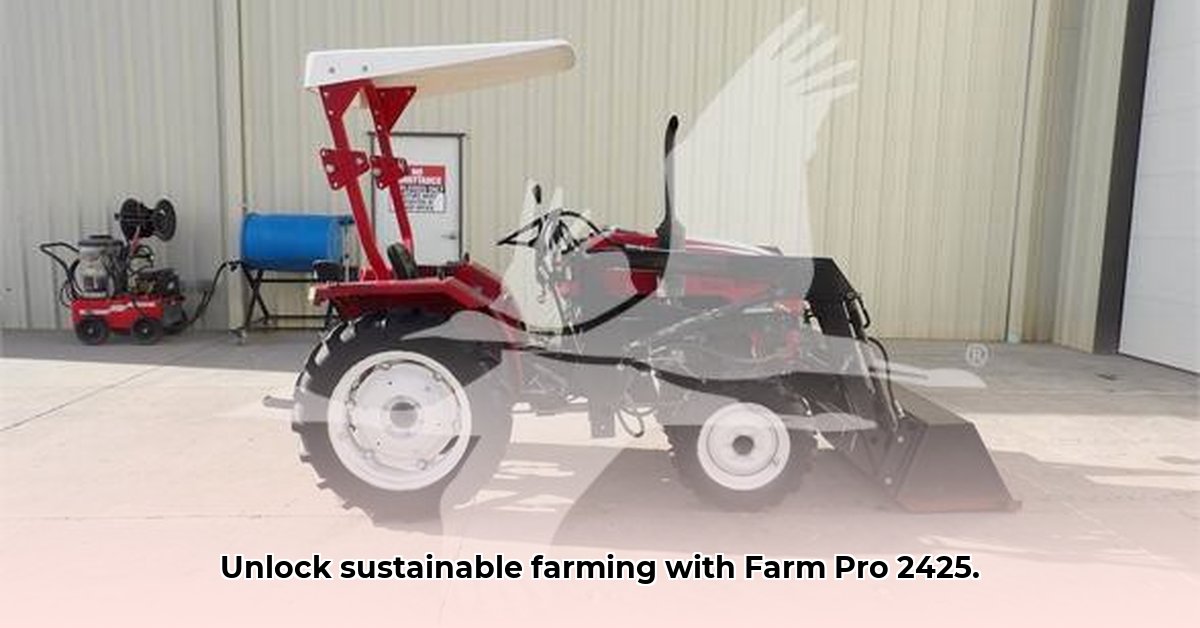
Thinking about a Farm Pro 2425 tractor for your small-scale operation? This guide helps you determine if it aligns with your sustainable farming goals. We'll examine its fuel efficiency, maintenance needs, and long-term environmental impact, comparing it to modern alternatives. For more horsepower comparisons, check out this helpful resource.
Getting to Know the Farm Pro 2425
The Farm Pro 2425 is a compact tractor, typically boasting a 25-horsepower engine and a 12-speed transmission. Its relatively simple design and manageable size make it appealing for smaller farms. However, its age (generally 2002-2006) means it uses older technology, impacting its sustainability. This is a crucial factor to keep in mind, as fuel efficiency and maintenance costs will differ dramatically from newer models.
Sustainability Analysis: Fuel, Maintenance, and Disposal
Sustainable farming requires careful consideration of resources. Let's assess the Farm Pro 2425's environmental footprint.
Fuel Efficiency: Precise fuel consumption data for the Farm Pro 2425 is scarce. Therefore, direct comparison with modern, fuel-efficient tractors is challenging. You must measure fuel usage practically. Keep a detailed log of fuel consumption for various tasks (e.g., plowing, tilling), calculating the cost per acre. Compare this to data you can find on newer models—this relative comparison is key. Wouldn't it be helpful to know exactly how much this older model compares to newer, more efficient tractors?
Maintenance and Parts: Finding parts for an older model can be difficult. Building relationships with local mechanics and online suppliers is crucial. Proactive maintenance is essential to prevent costly breakdowns. Get quotes for routine servicing and factor potential repair costs into your budget. How much will maintaining a Farm Pro 2425 cost relative to a newer model, considering both parts availability and labor?
End-of-Life Management: Responsible disposal is vital. Investigate trade-in options (though the value will likely be low) and explore local recycling programs for agricultural machinery. Simply discarding the tractor has significant environmental consequences. What are your options for responsibly disposing of the tractor when it's no longer usable, and what are the associated costs?
Instructional Guide: Assessing Suitability
Follow these steps to determine if the Farm Pro 2425 meets your sustainable farming needs:
Task Assessment: Does the 25 horsepower engine suffice for your farm's tasks? Avoid overestimating its capabilities.
Fuel Monitoring: Maintain a meticulous log of fuel usage, calculating costs per acre for various operations.
Maintenance Planning: Create a preventative maintenance schedule, secure reliable mechanics and parts suppliers, and obtain quotes for routine servicing.
Long-Term Planning: Research resale/trade-in value and environmentally responsible disposal options.
Modern Alternatives Exploration: Thoroughly research newer tractors emphasizing fuel efficiency, emission levels, and long-term maintenance costs. Compare this to your fuel usage data.
Weighing the Pros and Cons
| Pros | Cons |
|---|---|
| Compact and maneuverable | Older technology; potentially less fuel-efficient |
| Relatively affordable (used market) | Parts availability may be challenging; higher costs |
| Simple mechanics | Higher maintenance costs are likely |
| Lower initial investment | Limited power compared to newer, more efficient machines |
Risk Assessment and Mitigation
| Aspect | Risk Level | Mitigation Strategies |
|---|---|---|
| Engine Efficiency | Medium | Meticulous fuel monitoring; explore potential upgrades (if feasible) |
| Parts Availability | High | Secure multiple parts suppliers; proactive parts stocking |
| Maintenance Costs | Medium | Preventative maintenance; explore cost-effective repair options |
| Environmental Impact | Medium | Research responsible disposal; consider eco-friendly alternatives |
Conclusion: Informed Decision-Making
The Farm Pro 2425 might suit some, but careful evaluation is crucial. Sustainable farming requires thorough research and mindful decision-making. Your choices directly impact your farm's success and the environment's health.
Further Resources
- TractorData.com (for tractor specifications, though data on fuel efficiency may be limited for older models)